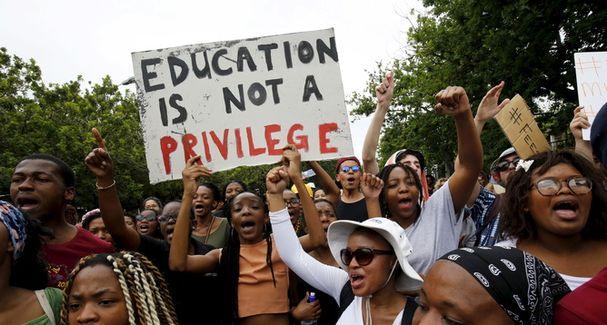
By Neelam Rahim
Ten years after the Fees Must Fall movement ignited South African campuses, the echoes of that defiant chant – “Asijiki!” (“We will not turn back”) – still resonate in lecture halls and policy rooms.
What began as a spark at Wits University in 2015 grew into a national reckoning, a call for free and decolonised education that no longer served only the privileged few. Young South Africans, armed with conviction and courage, stood at the frontlines demanding not just lower fees, but justice, equality, and dignity.
Among the most visible faces were Fasiha Hassan and Shaeera Kalla – both professionals whose leadership helped shape the movement. Hassan, now a Member of Parliament for the African National Congress (ANC) and winner of the 2016 International Student Peace Prize, described the experience as transformative: “It changed the course of our lives. It made us understand that leadership isn’t a title, it’s service.” Kalla, who served as President of the Wits Student Representative Council (SRC), was shot by police during the protests and today serves on the board of Section 27. She reflected on the courage it demanded: “We didn’t break the system, we exposed it.” Both women continue to carry the lessons of activism into their professional lives, showing that leadership and justice extend far beyond campus gates.
Yet the movement was never only about its leaders. Hundreds of students printed pamphlets, sheltered peers, organised marches, and faced tear gas and arrest. The collective effort yielded tangible wins: partial fee freezes, the insourcing of university workers, and a renewed national debate on access to higher education. Every voice, every action, contributed to a generation-defining struggle that challenged the country to rethink access, justice, and belonging.
At the time, university leaders were also tested. Professor Adam Habib, then Vice-Chancellor of Wits University, described Fees Must Fall as “both a challenge to authority and a moment of renewal,” writing that “the youth forced universities, and the country, to confront truths we could no longer avoid.” His account captured both the tension and the potential for change that the movement revealed. Habib later reflected on these experiences in his book Rebels and Rage: Reflecting on Fees Must Fall, offering a detailed account of the student movement and the issues it raised.
Irfaan Mangera, a first-year student at the time and now Head of Education at We The People SA, recalls stepping off the bus from Lenasia and joining the protests, unaware that the moment would shape his life. Speaking to Al-Qalam, he said, “It was a generation-defining moment. A reminder that young people can shake the foundations of power when they act collectively and with conviction.”
Mangera emphasised the human side of activism. “Students fed one another, cleaned campuses after protests, and built organisations to argue their case for justice. Activism isn’t only about defiance, it’s about care, courage, and accountability.”
Today, he channels that same spirit into civic education and constitutional literacy. “Activism sparks awareness; institutions sustain transformation,” he told Al-Qalam. For him, faith was a grounding force: spaces like the Muslim Students Association and the Palestine Solidarity Campaign offered reflection, resilience, and solidarity.
Reflecting on the decade since, Mangera says today’s youth must carry forward more than energy. “Education is a public good, not a privilege for the few. Justice isn’t achieved only by shouting at power; it’s built through ethical leadership, collaboration, and solidarity across generations.”
The legacy of Fees Must Fall is also visible in policy and institutional change. Beyond partial fee freezes, universities began listening more carefully to student voices, unions gained stronger bargaining power, and campaigns for equality in education now have a roadmap for advocacy.
But the movement’s lessons extend far beyond campuses. They are for every young South African willing to challenge power, for every citizen called to act with courage and conscience. Fees Must Fall was a mirror held up to the nation, a reminder that change is earned through persistence, principle, and collective action. Ten years on, the chants may have faded, but the fire remains, daring a new generation to claim their space, speak truth, and refuse to be silent in shaping the future of education and justice in South Africa.










